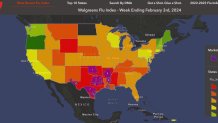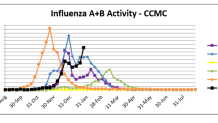If you feel like everyone around you is getting sick at work or at home with the flu, you're not alone.
Experts say DFW is seeing the strongest flu season the area has faced in years.
Doctors say North Texas is currently in the middle of the peak of flu season as of the beginning of February. The season typically starts in October.
A map from the Walgreens Flu Index backs it up. DFW ranks number two in the nation for flu activity this week, with heightened flu activity happening in this part of the country.
Get DFW local news, weather forecasts and entertainment stories to your inbox. Sign up for NBC DFW newsletters.

Flu season every year is going to peak right around now. January to February is always going to be the worst,” said Dr. Joseph Chang, Chief Medical Officer for Parkland Health in Dallas. “It starts to get better in March and then kind of goes away in April. So we're right the thick of it right now.”
Dallas Children’s Medical Center tells NBC 5 that during the last week in January, they treated the most flu patients they’ve had since 2022. New numbers showed that during the week beginning on Jan. 28, the hospital treated 720 flu cases systemwide.
Local
The latest news from around North Texas.
Hospital staff said that number marked a 20% jump in cases over the week before - and the most patients treated in a week since 2022.
At Cook Children's Medical Center in Fort Worth, hundreds more patients are coming back positive with the flu than RSV or COVID currently.

GET THE FACTS: FLU VACCINE
Throughout the flu season, rumors swirl about the flu vaccine and just how effective it is.
Dr. Chang said the truth is, every year is a little bit different, and this year is not unlike the others.
“If you'll recall the year before COVID, that was a particularly bad year for flu. That was mainly because the vaccine that year truly did not work as well,” said Dr. Chang.
The reason for that is simple and has to do with the guessing game doctors must figure out before the flu season even starts.
Every year, the Centers for Disease Control decides what strains of the flu virus they will concentrate on for the year based on the flu season in the southern hemisphere, where the winter season just as the northern hemisphere’s begins. Travelers spread the flu strains around the globe, as winter seasons force more people indoors.
“And then we make an educated guess as to what ours might be in relative to that,” said Dr. Chang. “Most years the flu vaccine is four strains of virus put into one vaccine. So, it's designed against four strains pretty much every single year. And again, that's an educated guess, because overall there are over a dozen flu strains that infect people at any given time.”
Dr. Chang added, “Now the thing to remember with the vaccines is that – because all of the flu viruses are basically part of the same family – if you get the vaccine, even if that year, the strains that are actually rolling around are not exactly the same as what is contained in the vaccine, you get a lot of good cross coverage anyway. So even when you see those years where the vaccine is not exactly matching up with what's going around, you're much better off getting the vaccine than not."
If you already got your flu vaccine earlier in the season, the effectiveness typically lasts for at least six months. The flu season still has about two months left, or eight weeks until it subsides.
“Even if you run out and get it now, you will still be protected for about 4 to 6 weeks,” Dr. Chang said. “Four to six weeks of protection is better than zero.”
For those who need financial assistance in getting a flu shot, Parkland’s Community Oriented Primary Care Centers offer free vaccines at no cost and no appointment necessary. To avoid a wait, Wednesdays are recommended. During Walk-In Wednesdays, a staff dedicated only to providing flu shots is available from 9 a.m. to noon and from 1 to 4 p.m.




